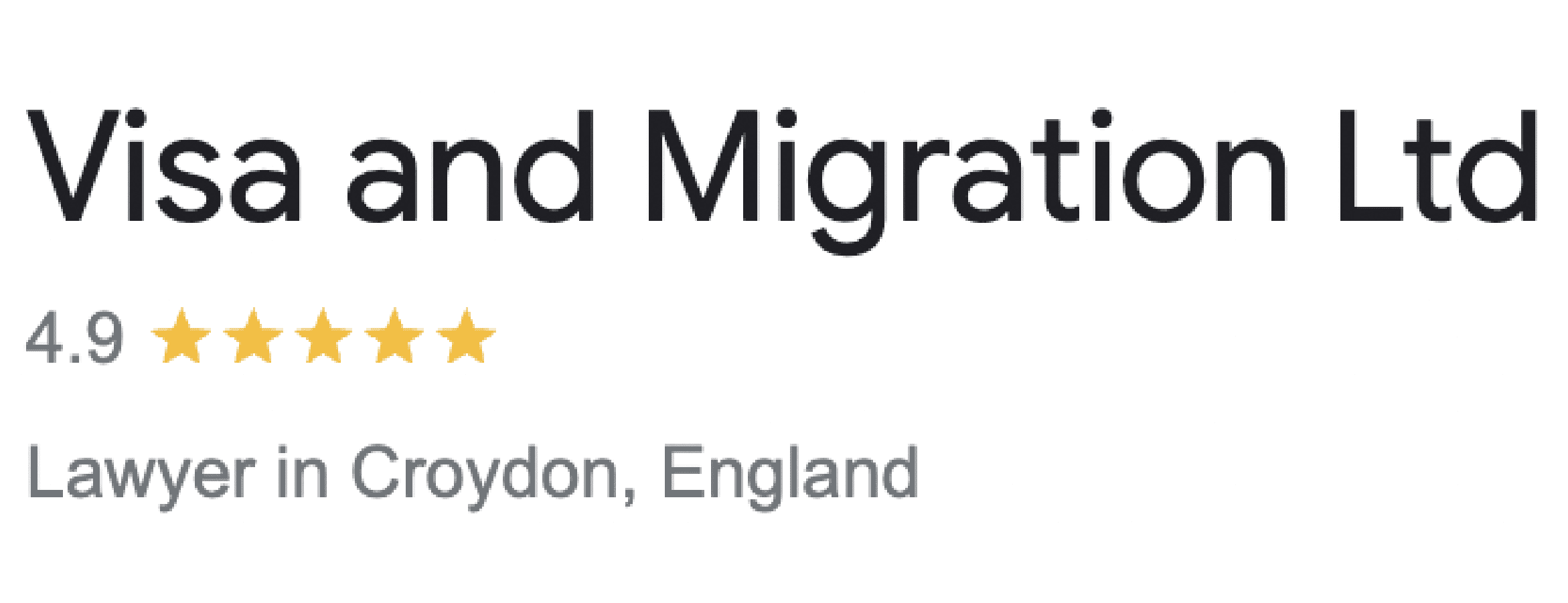





We pride ourselves in providing great customer experience for UK immigration services
We are top immigration lawyers in London, specialise exclusively in UK immigration and nationality law. We provide UK visa services in London and clients from across the globe, supporting you with applications for fiance visas, marriage visas, entrepreneur visas, and sponsorship licences, as well as visa appeals and administrative review processes if you have been refused a UK visa. Due to the complex and constantly changing nature of immigration law in the UK, we strongly recommend that you use visa solicitors to support and represent you from the start. Regulated by the Office of the Immigration Services Commissioner (OISC), get in touch with our immigration solicitors in Croydon, London today for an honest opinion of your case, any possible costs, and your available options.
Spouse Visas
Fiance Visas
Sponsor Licences
Visit Visas

As soon as you contact us via phone or email, your call or email is answered by an immigration solicitor in Croydon. We assess your circumstances to make sure that you are meeting all the relevant requirements of the Immigration Rules.
Once we have carried out a complete assessment and you have instructed us by signing letter of authority and making payment of our fee, you will generally work with the same caseworker who answered your initial call. This allows no misunderstandings to occur during the process we represent your application.
We provide you with a list of documents unique to circumstances of your case. We also provide you with relevant templates and questionnaire to gather of the basic information such as your address, parents’/dependents’ details, etcetera.
After we have started the process for your application you can contact us via phone and emails which are answered always. We never charge you an additional fee for numerous calls or emails you do or we respond to.
Our immigration solicitors in London (Croydon) will always keep you informed on the progress of your case via phone calls and emails, so you never miss any important information. We always explain you what the information means so that you are correctly advised on what you may need to do.

You always get one fee with us and you are provided only one invoice for your case which covers our work from beginning to end.
You never get a surprise bill with us you are always told in advance what you will be paying and what service you will be receiving.
We always keep the best interest of our client at heart and go the extra mile to provide excellent experience for a fixed fee for representing the case from beginning to end.

We will never misguide you to take your money, if it cannot be done we will tell you what you need to do to get it right before we take on your case.
We minimise the time for the process and make it Fast, Easy and Secure. Your information and documents are always protected with us and the information will never be shared with anyone else unless we have your consent in writing.
Our advisers research on cases regularly to keep abreast with ever changing Immigration Law in the UK. We always provide submissions with your case which gives the application high chances of success. Success is always our aim for your case and we will always fight your corner strongly.
Our firm is one of the top immigration lawyers London. Our staff have Law degrees from UK Universities and are regulated by the OISC and the Law Society of England and Wales. Our lawyers have experience of over 20 years and have vast knowledge in the field of UK Immigration Law. Our Lawyers provide high standards of UK Visa services in London by always keeping up to date with relevant changes to the UK Immigration Law. Our Lawyers also regularly train themselves by attending various webinars and training with providers such as Immigration Law Practitioners Association and the Law Society to keep their personal development record to the highest standards in practice.
Read MoreWhat our Client's Say
Very professional people. The service I received was just fantastic ( don't have the words to describe it). First time phone call to last day when I received my wife's visa was just effortless. My caseworker guided me throughout the process. He was always on hand to answer any question. I did the minimum but all the hard work on my wife's application was done by Caseworker. Put through the application and visa was granted within 5 weeks. That's because professionalism of Visa and Migration. Well done guys, truly professional company who put theirs customers interest first. I applied my wife visa Perviouly with some other company and due lack of experience we got refusal but well done Visa and Migration made impossible to possble.
I found the service and commitment to ensure my wife's visa from Philippines went through smoothly. My Caseworker helped me with all the immigration process and made it as simple as possible second to none. I took the time to research many organisations which offer a similar service, none of which were as friendly, attentive and helpful as Visa and Migration. Genuinely my caseworker filled the application with me over the phone call of 2 hours as I was not too good with computers.
My wife got the visa in 4 weeks and we are delighted to have chosen Visa and Migration. I and my wife will recommend Visa and Migration for all the hard work they have put in my case.
Indefinite Leave to Remain
Thank you Visa and Migration! The process was so easy, the team very friendly and everything just worked out fine with your help.
Thank you very much.
I have recently got my ILR and I can’t thank enough VISA and Migration for the same. They are very professional and they have the most up to date knowledge of everything which has helped me to get the things done right at the first attempt. They made the process look so seamless. I will highly recommend them. All the best guys and keep up the good work.
Thanx to uk visa and migration ltd and specially the most Brilliant immigration caseworker mR vaibhav tanwar for handling my caSe successfully in the first attempt. Today i am with my family happily in the uk. I highly recommend vaibhav tanwar and his team.
THank yoU for all The Hard works Done by mr vaibHav Tanwar and his team Who not only comPleted our case SUCCESSFULLY but also process was hassle free. I along with my son got visa in the first attempt. I highly recommend mr vaibhav tanwar and uk visa and migration ltd who helped to Unite my family..
Thank you visa and migration ltd ,specially mr vaibhav tanwar the brilliant immigration caseworker in country who not only Completed my case sucssefully but also without any hassle. Today my family is together happily. I highly recommend mr vaibhav tanwar and his team...
I am absolutely overjoyed with the service from Visa and Migration Ltd. My caseworker was superb at dealing with our case we cant thank them enough. I would recommend you to anyone doing this kind of application. excellent service.Visa and Migration Ltd team have been extremely helpful, dedicated and information in handing my case. my case was not an easy one. document after document needed to put it Wright as my case was difficult. my case worker is a real professional handling my case, case from Nigeria is not easy to handle. with out Visa and Migration Ltd, my visa application it could have been refused . I recommend . once again thank you.
No, you cannot switch into another visa category from within the UK, as the UK immigration rules do not permit this.
You can call us or email us and once we carry out an initial assessment and if you will be able to meet the requirements, we will send you a client care letter with details of our discussion and our advice.
There are general documents such as passport, your biometrics, etcetera. However, evidence to be provided always depends on your personal circumstances so there are never one size fits all when it comes to the documents or evidence required.
Our fee depends on the complexities of the application. For example, if you have been refused before or have been in breach of UK Immigration Laws then we need to assess how much more time we need to spend on a case to get a positive outcome, so our fee is different depending on circumstances of an applicant.
Generally, under most categories you can apply for ILR after spending 5 years, unless you are applying for ILR on the Long Residency ILR basis which is granted after 10 years or you are on category which leads to ILR after 10 years, such as, 10 years parent route or you are granted leave on exceptional circumstances.
It depends on the category you are applying under for example if you are applying for a fiancé or spouse visa from outside the UK you need Level A 1 CEFR or for skilled worker visa you need Level B1 CEFR. Different type of applications need different English Level tests.